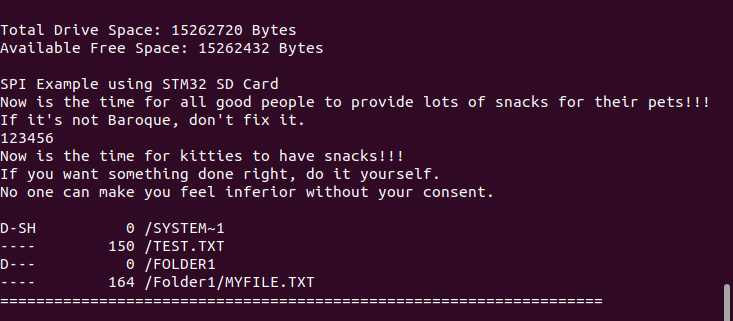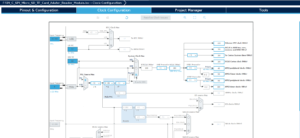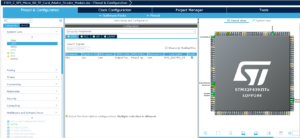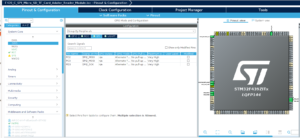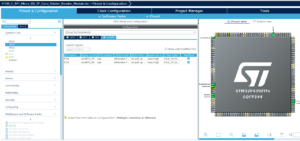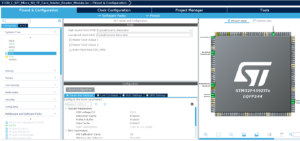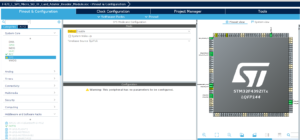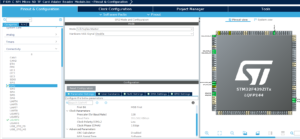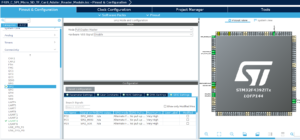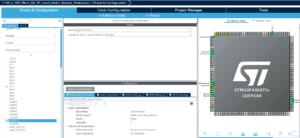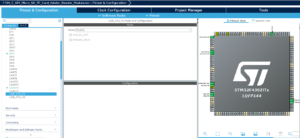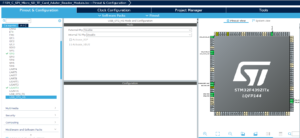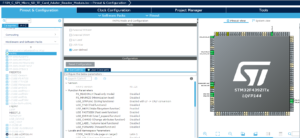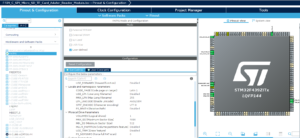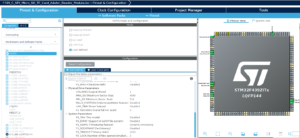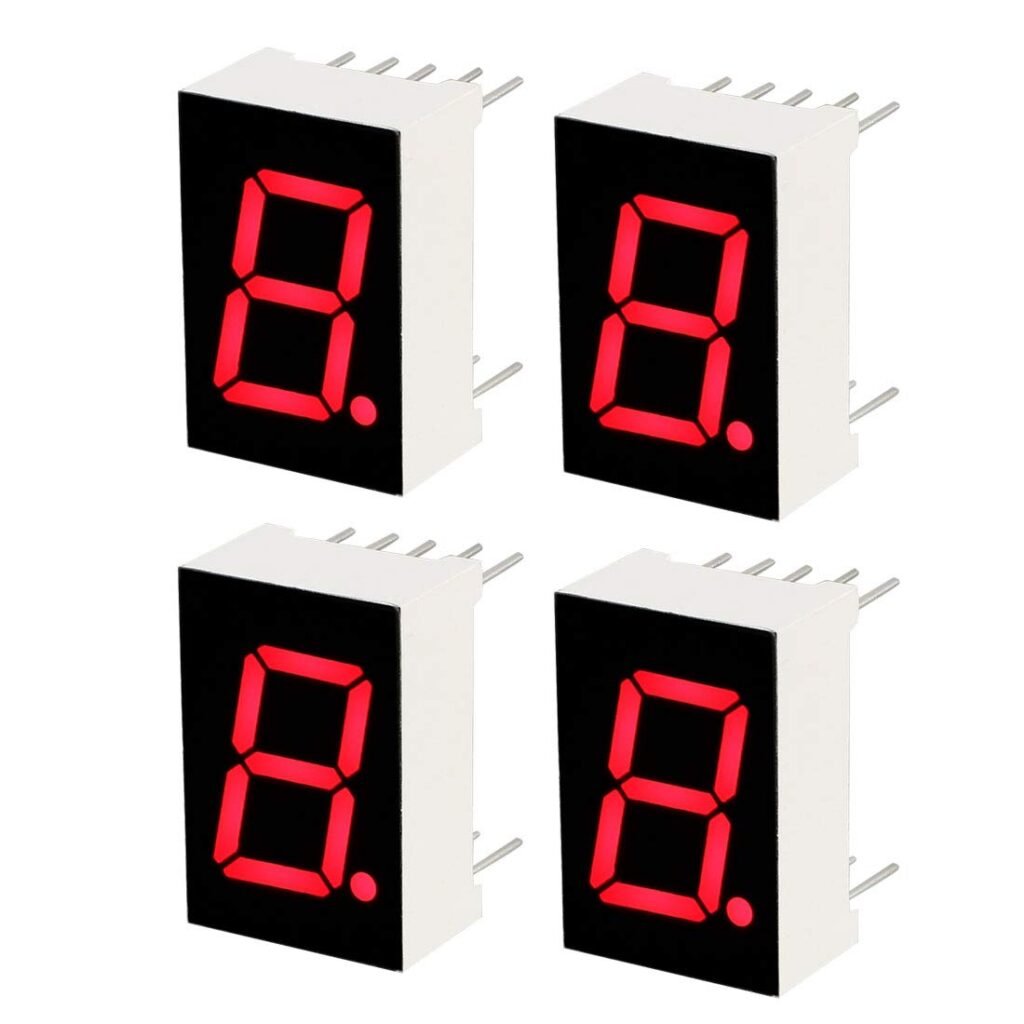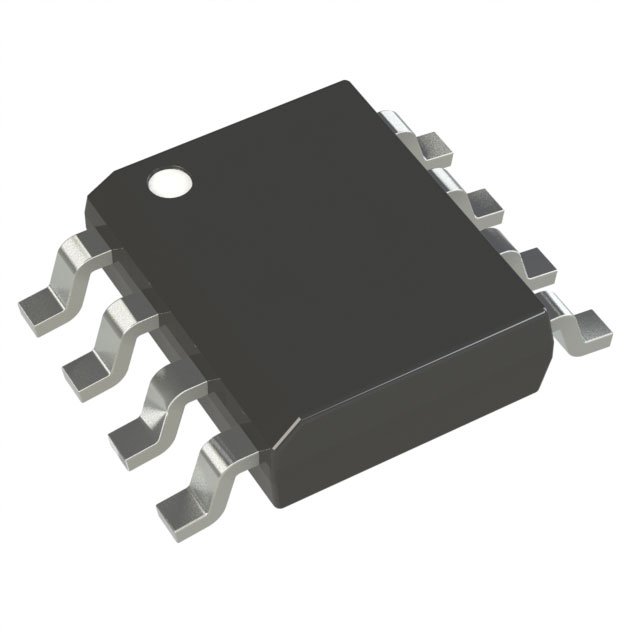Introduction
In this tutorial, we’re embarking on an exciting journey to interface SPI MicroSD TF Adapter Reader Module with STM32 µP. Once you’ve set up and configured this nifty little adapter, you’ll find yourself with the power to read and write files and manage directories just like you would with a typical FAT File System hard drive. Imagine the possibilities! You could store valuable data captured by sensors, or save images to display on an LCD module, bringing your projects to life in vivid detail. Additionally, this setup can serve as a robust method for storing and retrieving application configuration parameters, streamlining your workflow. So, roll up your sleeves and get ready to enhance your project capabilities—your creativity is the only limit!
Materials List
- FTDI to USB
- NUCLEO-F439ZI
- Micro SDTF Card Adapter Module 6 Pin SPI Interface Driver Module
- SD Card 16GB with SD Adapter, High Speed Memory Card, UHS-I C10 A1 Memory TF Card
- Breadboards Kit Include 2PCS 830 Point 2PCS 400 Point Solderless Breadboards
FTDI FT232RL Mini USB to TTL Serial Converter Adapter
FTDI to USB Pinout from right to left
- Pin 1 – GND
- Pin 2 – CTS
- Pin 3 – VCC
- Pin 4 – TX
- Pin 5 – RX
- Pin 6 – DTR
- USB Mini – Connect to PC via USB cable
Make sure the jumper is set for 5v or 3v which ever is being used to power the FTDI device. If we look below at the schematic, it is showing in this case as 5v.
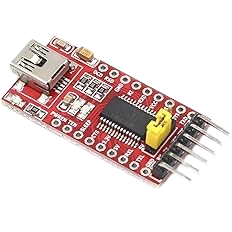
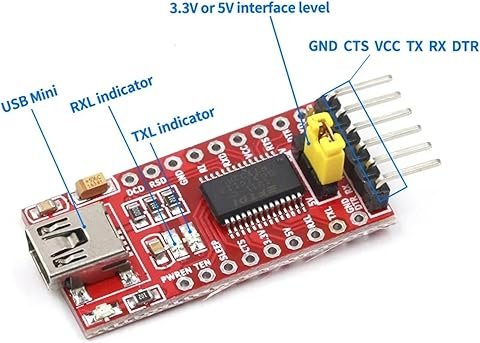
MicroSD TFCard Adapter Module
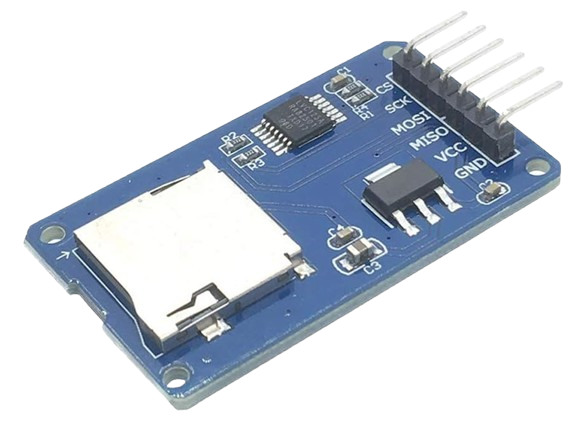
Schematic
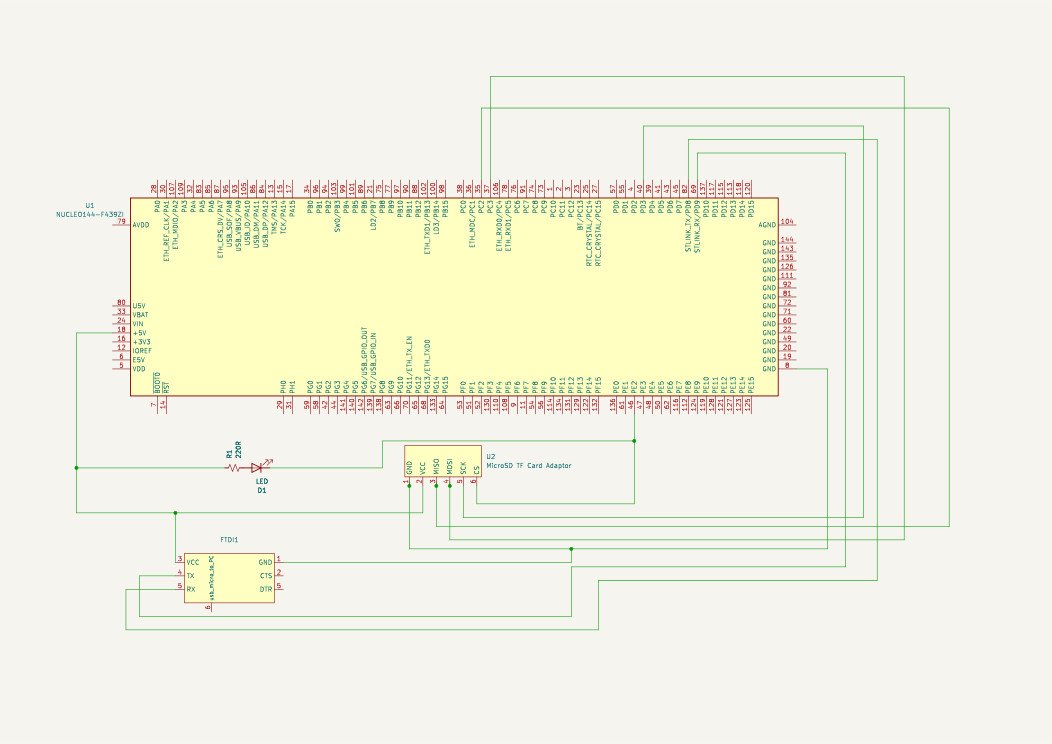
Pinouts & Configurations
Exploring the Source Code for the MicroSD TFCard Adapter Module
main.h
/* USER CODE BEGIN Header */
/**
******************************************************************************
* @file : main.h
* @brief : Header for main.c file.
* This file contains the common defines of the application.
******************************************************************************
* @attention
*
* Copyright (c) 2024 STMicroelectronics.
* All rights reserved.
*
* This software is licensed under terms that can be found in the LICENSE file
* in the root directory of this software component.
* If no LICENSE file comes with this software, it is provided AS-IS.
*
******************************************************************************
*/
/* USER CODE END Header */
/* Define to prevent recursive inclusion -------------------------------------*/
#ifndef __MAIN_H
#define __MAIN_H
#ifdef __cplusplus
extern "C" {
#endif
/* Includes ------------------------------------------------------------------*/
#include "stm32f4xx_hal.h"
/* Private includes ----------------------------------------------------------*/
/* USER CODE BEGIN Includes */
/* USER CODE END Includes */
/* Exported types ------------------------------------------------------------*/
/* USER CODE BEGIN ET */
/* USER CODE END ET */
/* Exported constants --------------------------------------------------------*/
/* USER CODE BEGIN EC */
/* USER CODE END EC */
/* Exported macro ------------------------------------------------------------*/
/* USER CODE BEGIN EM */
/* USER CODE END EM */
/* Exported functions prototypes ---------------------------------------------*/
/* USER CODE BEGIN EFP */
/* USER CODE END EFP */
/* Private defines -----------------------------------------------------------*/
#define SPI2_SDCARD_CS_Pin GPIO_PIN_2
#define SPI2_SDCARD_CS_GPIO_Port GPIOE
#define MCO_Pin GPIO_PIN_0
#define MCO_GPIO_Port GPIOH
#define STLK_RX_Pin GPIO_PIN_8
#define STLK_RX_GPIO_Port GPIOD
#define STLK_TX_Pin GPIO_PIN_9
#define STLK_TX_GPIO_Port GPIOD
/* USER CODE BEGIN Private defines */
#define SDCARD_CS_ENABLE HAL_GPIO_WritePin(SPI2_SDCARD_CS_GPIO_Port, SPI2_SDCARD_CS_Pin, 0);
#define SDCARD_CS_DISABLE HAL_GPIO_WritePin(SPI2_SDCARD_CS_GPIO_Port, SPI2_SDCARD_CS_Pin, 1);
void _Error_Handler(const char *, int);
#define Error_Handler() _Error_Handler((const char *)__FILE__, __LINE__)
#define REDIRECT_PRINTF
/* USER CODE END Private defines */
#ifdef __cplusplus
}
#endif
#endif /* __MAIN_H */
main.c
/* USER CODE BEGIN Header */
/**
******************************************************************************
* @file : main.c
* @brief : Main program body
******************************************************************************
* @attention
*
* Copyright (c) 2024 STMicroelectronics.
* All rights reserved.
*
* This software is licensed under terms that can be found in the LICENSE file
* in the root directory of this software component.
* If no LICENSE file comes with this software, it is provided AS-IS.
*
******************************************************************************
*/
/* USER CODE END Header */
/* Includes ------------------------------------------------------------------*/
#include "main.h"
#include "fatfs.h"
/* Private includes ----------------------------------------------------------*/
/* USER CODE BEGIN Includes */
#include <stdio.h>
#include "string.h"
#include "stdbool.h"
/* USER CODE END Includes */
/* Private typedef -----------------------------------------------------------*/
/* USER CODE BEGIN PTD */
/* USER CODE END PTD */
/* Private define ------------------------------------------------------------*/
/* USER CODE BEGIN PD */
/* USER CODE END PD */
/* Private macro -------------------------------------------------------------*/
/* USER CODE BEGIN PM */
/* USER CODE END PM */
/* Private variables ---------------------------------------------------------*/
SPI_HandleTypeDef hspi2;
UART_HandleTypeDef huart3;
/* USER CODE BEGIN PV */
FATFS fs;
/* USER CODE END PV */
/* Private function prototypes -----------------------------------------------*/
void SystemClock_Config(void);
static void MX_GPIO_Init(void);
static void MX_SPI2_Init(void);
static void MX_USART3_UART_Init(void);
/* USER CODE BEGIN PFP */
void dirList(DIR dir, char *path);
void writeFile(char *fileName, char **buffer);
/* USER CODE END PFP */
/* Private user code ---------------------------------------------------------*/
/* USER CODE BEGIN 0 */
#ifdef REDIRECT_PRINTF
#define PUTCHAR_PROTOTYPE int __io_putchar(int ch)
#endif
#ifdef REDIRECT_PRINTF
/**
* @brief Retargets the C library printf function to the USART.
* @param None
* @retval None
*/
PUTCHAR_PROTOTYPE
{
/* Place your implementation of fputc here */
/* e.g. write a character to the USART2 and Loop until the end of transmission */
HAL_UART_Transmit(&huart3, (uint8_t *)&ch, 1, 0xFFFF);
return ch;
}
#endif
void dirList(DIR dir, char *path) {
char string[1024];
FRESULT res = f_opendir(&dir, path);
#ifdef DBG
if (res != FR_OK)
printf("res = %d f_opendir\r\n", res);
#endif
if (res == FR_OK)
{
while(1)
{
FILINFO fno;
res = f_readdir(&dir, &fno);
#ifdef DBG
if (res != FR_OK)
printf("res = %d f_readdir\r\n", res);
#endif
if ((res != FR_OK) || (fno.fname[0] == 0)) {
f_closedir(&dir);
break;
}
memset(string, 0x00, sizeof(string));
sprintf(string, "%c%c%c%c %10d %s/%s\r\n",
((fno.fattrib & AM_DIR) ? 'D' : '-'),
((fno.fattrib & AM_RDO) ? 'R' : '-'),
((fno.fattrib & AM_SYS) ? 'S' : '-'),
((fno.fattrib & AM_HID) ? 'H' : '-'),
(int)fno.fsize, path, fno.fname);
printf(string);
}
}
}
void mountFatFS() {
/* Mount SD Card */
if(f_mount(&fs, "", 0) != FR_OK)
Error_Handler();
}
void unmountFatFS() {
/* Unmount SDCARD */
if(f_mount(NULL, "", 1) != FR_OK)
Error_Handler();
}
long displayFatFSSize() {
char usartBuf[80];
DWORD fre_clust;
uint32_t totalSpace, freeSpace;
FATFS *pfs;
/* Check freeSpace space */
if(f_getfree("", &fre_clust, &pfs) != FR_OK)
Error_Handler();
totalSpace = (uint32_t)((pfs->n_fatent - 2) * pfs->csize * 0.5);
freeSpace = (uint32_t)(fre_clust * pfs->csize * 0.5);
sprintf(usartBuf, "\r\nTotal Drive Space: %ld Bytes\r\n", totalSpace);
printf(usartBuf);
sprintf(usartBuf, "Available Free Space: %ld Bytes\r\n", freeSpace);
printf(usartBuf);
return(freeSpace);
}
void writeFile(char *fileName, char **buffer) {
FIL fil;
char *tempBuf;
/* Open file to write */
if(f_open(&fil, fileName, FA_OPEN_ALWAYS | FA_READ | FA_WRITE) != FR_OK) {
Error_Handler();
}
for (int i = 0; buffer[i] != NULL; i ++) {
tempBuf = buffer[i];
/* Writing text */
f_puts(tempBuf, &fil);
}
/* Close file */
if(f_close(&fil) != FR_OK)
Error_Handler();
}
void readFile(char *fileName) {
FIL fil;
char buffer[1024];
/* Open file to read */
if(f_open(&fil, fileName, FA_READ) != FR_OK) {
Error_Handler();
}
while(f_gets(buffer, sizeof(buffer), &fil))
{
printf("%s\r", buffer);
fflush(stdout);
}
/* Close file */
if(f_close(&fil) != FR_OK) {
Error_Handler();
};
}
void testSDCard() {
FRESULT res;
char *buffer[10] = {0x00};
mountFatFS();
/* free space is less than 1kb */
if(displayFatFSSize() < 1) {
Error_Handler();
}
printf("\r\n");
// Remove file "test.txt" if it exists.
f_unlink("test.txt");
buffer[0] = "SPI Example using STM32 SD Card\n";
buffer[1] = "Now is the time for all good people to provide lots of snacks for their pets!!!\n";
buffer[2] = "If it's not Baroque, don't fix it.\n";
buffer[3] = NULL;
writeFile("test.txt", buffer);
memset(buffer, 0x00, sizeof(buffer));
readFile("test.txt");
// Create a folder
res = f_mkdir("/Folder1");
// Check to see if something went wrong
if (res != FR_OK) {
// Not FR_OK, so it's ok if the issue was that the folder already existed, otherwise fail!
if (res != FR_EXIST) {
Error_Handler();
}
}
buffer[0] = "123456\n";
buffer[1] = "Now is the time for kitties to have snacks!!!\n";
buffer[2] = "If you want something done right, do it yourself.\n";
buffer[3] = "No one can make you feel inferior without your consent. \n";
buffer[4] = NULL;
// Remove the file myfile.txt inside the folder "folder1"
res = f_unlink("/folder1/myFile.txt");
writeFile("/folder1/myFile.txt", buffer);
memset(buffer, 0x00, sizeof(buffer));
readFile("/folder1/myFile.txt");
printf("\r\n");
DIR dir;
dirList(dir, "");
dirList(dir, "/Folder1");
unmountFatFS();
printf("===================================================================\r\n");
fflush(stdout);
}
/* USER CODE END 0 */
/**
* @brief The application entry point.
* @retval int
*/
int main(void)
{
/* USER CODE BEGIN 1 */
/* USER CODE END 1 */
/* MCU Configuration--------------------------------------------------------*/
/* Reset of all peripherals, Initializes the Flash interface and the Systick. */
HAL_Init();
/* USER CODE BEGIN Init */
/* USER CODE END Init */
/* Configure the system clock */
SystemClock_Config();
/* USER CODE BEGIN SysInit */
/* USER CODE END SysInit */
/* Initialize all configured peripherals */
MX_GPIO_Init();
MX_FATFS_Init();
MX_SPI2_Init();
MX_USART3_UART_Init();
/* USER CODE BEGIN 2 */
// The following block of code turns on an LED which just exercises the Chip Select (CS) for the MicroSD Adapter Card
// This is for show only!!!
SDCARD_CS_ENABLE;
HAL_Delay(2000);
SDCARD_CS_DISABLE;
printf("\x1b[2J\x1b[H"); // Clear the dumb terminal screen
/* USER CODE END 2 */
/* Infinite loop */
/* USER CODE BEGIN WHILE */
while (1)
{
/* USER CODE END WHILE */
/* USER CODE BEGIN 3 */
testSDCard();
HAL_Delay(10000);
}
/* USER CODE END 3 */
}
/**
* @brief System Clock Configuration
* @retval None
*/
void SystemClock_Config(void)
{
RCC_OscInitTypeDef RCC_OscInitStruct = {0};
RCC_ClkInitTypeDef RCC_ClkInitStruct = {0};
/** Configure the main internal regulator output voltage
*/
__HAL_RCC_PWR_CLK_ENABLE();
__HAL_PWR_VOLTAGESCALING_CONFIG(PWR_REGULATOR_VOLTAGE_SCALE1);
/** Initializes the RCC Oscillators according to the specified parameters
* in the RCC_OscInitTypeDef structure.
*/
RCC_OscInitStruct.OscillatorType = RCC_OSCILLATORTYPE_HSI;
RCC_OscInitStruct.HSIState = RCC_HSI_ON;
RCC_OscInitStruct.HSICalibrationValue = RCC_HSICALIBRATION_DEFAULT;
RCC_OscInitStruct.PLL.PLLState = RCC_PLL_ON;
RCC_OscInitStruct.PLL.PLLSource = RCC_PLLSOURCE_HSI;
RCC_OscInitStruct.PLL.PLLM = 8;
RCC_OscInitStruct.PLL.PLLN = 180;
RCC_OscInitStruct.PLL.PLLP = RCC_PLLP_DIV2;
RCC_OscInitStruct.PLL.PLLQ = 4;
if (HAL_RCC_OscConfig(&RCC_OscInitStruct) != HAL_OK)
{
Error_Handler();
}
/** Activate the Over-Drive mode
*/
if (HAL_PWREx_EnableOverDrive() != HAL_OK)
{
Error_Handler();
}
/** Initializes the CPU, AHB and APB buses clocks
*/
RCC_ClkInitStruct.ClockType = RCC_CLOCKTYPE_HCLK|RCC_CLOCKTYPE_SYSCLK
|RCC_CLOCKTYPE_PCLK1|RCC_CLOCKTYPE_PCLK2;
RCC_ClkInitStruct.SYSCLKSource = RCC_SYSCLKSOURCE_PLLCLK;
RCC_ClkInitStruct.AHBCLKDivider = RCC_SYSCLK_DIV1;
RCC_ClkInitStruct.APB1CLKDivider = RCC_HCLK_DIV4;
RCC_ClkInitStruct.APB2CLKDivider = RCC_HCLK_DIV2;
if (HAL_RCC_ClockConfig(&RCC_ClkInitStruct, FLASH_LATENCY_5) != HAL_OK)
{
Error_Handler();
}
}
/**
* @brief SPI2 Initialization Function
* @param None
* @retval None
*/
static void MX_SPI2_Init(void)
{
/* USER CODE BEGIN SPI2_Init 0 */
/* USER CODE END SPI2_Init 0 */
/* USER CODE BEGIN SPI2_Init 1 */
/* USER CODE END SPI2_Init 1 */
/* SPI2 parameter configuration*/
hspi2.Instance = SPI2;
hspi2.Init.Mode = SPI_MODE_MASTER;
hspi2.Init.Direction = SPI_DIRECTION_2LINES;
hspi2.Init.DataSize = SPI_DATASIZE_8BIT;
hspi2.Init.CLKPolarity = SPI_POLARITY_LOW;
hspi2.Init.CLKPhase = SPI_PHASE_1EDGE;
hspi2.Init.NSS = SPI_NSS_SOFT;
hspi2.Init.BaudRatePrescaler = SPI_BAUDRATEPRESCALER_128;
hspi2.Init.FirstBit = SPI_FIRSTBIT_MSB;
hspi2.Init.TIMode = SPI_TIMODE_DISABLE;
hspi2.Init.CRCCalculation = SPI_CRCCALCULATION_DISABLE;
hspi2.Init.CRCPolynomial = 10;
if (HAL_SPI_Init(&hspi2) != HAL_OK)
{
Error_Handler();
}
/* USER CODE BEGIN SPI2_Init 2 */
/* USER CODE END SPI2_Init 2 */
}
/**
* @brief USART3 Initialization Function
* @param None
* @retval None
*/
static void MX_USART3_UART_Init(void)
{
/* USER CODE BEGIN USART3_Init 0 */
/* USER CODE END USART3_Init 0 */
/* USER CODE BEGIN USART3_Init 1 */
/* USER CODE END USART3_Init 1 */
huart3.Instance = USART3;
huart3.Init.BaudRate = 19200;
huart3.Init.WordLength = UART_WORDLENGTH_8B;
huart3.Init.StopBits = UART_STOPBITS_1;
huart3.Init.Parity = UART_PARITY_NONE;
huart3.Init.Mode = UART_MODE_TX_RX;
huart3.Init.HwFlowCtl = UART_HWCONTROL_NONE;
huart3.Init.OverSampling = UART_OVERSAMPLING_16;
if (HAL_UART_Init(&huart3) != HAL_OK)
{
Error_Handler();
}
/* USER CODE BEGIN USART3_Init 2 */
/* USER CODE END USART3_Init 2 */
}
/**
* @brief GPIO Initialization Function
* @param None
* @retval None
*/
static void MX_GPIO_Init(void)
{
GPIO_InitTypeDef GPIO_InitStruct = {0};
/* USER CODE BEGIN MX_GPIO_Init_1 */
/* USER CODE END MX_GPIO_Init_1 */
/* GPIO Ports Clock Enable */
__HAL_RCC_GPIOE_CLK_ENABLE();
__HAL_RCC_GPIOC_CLK_ENABLE();
__HAL_RCC_GPIOH_CLK_ENABLE();
__HAL_RCC_GPIOD_CLK_ENABLE();
/*Configure GPIO pin Output Level */
HAL_GPIO_WritePin(SPI2_SDCARD_CS_GPIO_Port, SPI2_SDCARD_CS_Pin, GPIO_PIN_RESET);
/*Configure GPIO pin : SPI2_SDCARD_CS_Pin */
GPIO_InitStruct.Pin = SPI2_SDCARD_CS_Pin;
GPIO_InitStruct.Mode = GPIO_MODE_OUTPUT_PP;
GPIO_InitStruct.Pull = GPIO_NOPULL;
GPIO_InitStruct.Speed = GPIO_SPEED_FREQ_LOW;
HAL_GPIO_Init(SPI2_SDCARD_CS_GPIO_Port, &GPIO_InitStruct);
/* USER CODE BEGIN MX_GPIO_Init_2 */
/* USER CODE END MX_GPIO_Init_2 */
}
/* USER CODE BEGIN 4 */
/**
* @brief This function is executed in case of error occurrence.
* @param file: The file name as string.
* @param line: The line in file as a number.
* @retval None
*/
void _Error_Handler(const char *file, int line)
{
/* USER CODE BEGIN Error_Handler_Debug */
__disable_irq();
#ifdef REDIRECT_PRINTF
char buf[80];
sprintf(buf, "Trapped in Error_Handler(). Called from: %s, line: %d\r\n", file, line);
printf(buf);
#endif
/* User can add his own implementation to report the HAL error return state */
while(1)
{
}
}
/* USER CODE END 4 */
#ifdef USE_FULL_ASSERT
/**
* @brief Reports the name of the source file and the source line number
* where the assert_param error has occurred.
* @param file: pointer to the source file name
* @param line: assert_param error line source number
* @retval None
*/
void assert_failed(uint8_t *file, uint32_t line)
{
/* USER CODE BEGIN 6 */
/* User can add his own implementation to report the file name and line number,
ex: printf("Wrong parameters value: file %s on line %d\r\n", file, line) */
/* USER CODE END 6 */
}
#endif /* USE_FULL_ASSERT */
fatfs_sd.h
In folder Core/Inc create an empty file called fatfs_sd.h and place the following code in that file. This file is need to interface with the MicroSD TFCard Adapter Module
#ifndef __FATFS_SD_H
#define __FATFS_SD_H
#include "main.h"
/* Definitions for MMC/SDC command */
#define CMD0 (0x40+0) /* GO_IDLE_STATE */
#define CMD1 (0x40+1) /* SEND_OP_COND */
#define CMD8 (0x40+8) /* SEND_IF_COND */
#define CMD9 (0x40+9) /* SEND_CSD */
#define CMD10 (0x40+10) /* SEND_CID */
#define CMD12 (0x40+12) /* STOP_TRANSMISSION */
#define CMD16 (0x40+16) /* SET_BLOCKLEN */
#define CMD17 (0x40+17) /* READ_SINGLE_BLOCK */
#define CMD18 (0x40+18) /* READ_MULTIPLE_BLOCK */
#define CMD23 (0x40+23) /* SET_BLOCK_COUNT */
#define CMD24 (0x40+24) /* WRITE_BLOCK */
#define CMD25 (0x40+25) /* WRITE_MULTIPLE_BLOCK */
#define CMD41 (0x40+41) /* SEND_OP_COND (ACMD) */
#define CMD55 (0x40+55) /* APP_CMD */
#define CMD58 (0x40+58) /* READ_OCR */
/* MMC card type flags (MMC_GET_TYPE) */
#define CT_MMC 0x01 /* MMC ver 3 */
#define CT_SD1 0x02 /* SD ver 1 */
#define CT_SD2 0x04 /* SD ver 2 */
#define CT_SDC 0x06 /* SD */
#define CT_BLOCK 0x08 /* Block addressing */
/* Functions */
DSTATUS SD_disk_initialize (BYTE pdrv);
DSTATUS SD_disk_status (BYTE pdrv);
DRESULT SD_disk_read (BYTE pdrv, BYTE* buff, DWORD sector, UINT count);
DRESULT SD_disk_write (BYTE pdrv, const BYTE* buff, DWORD sector, UINT count);
DRESULT SD_disk_ioctl (BYTE pdrv, BYTE cmd, void* buff);
#define SPI_TIMEOUT 100
extern SPI_HandleTypeDef hspi2;
#define HSPI_SDCARD &hspi2
#define SD_CS_PORT SPI2_SDCARD_CS_GPIO_Port
#define SD_CS_PIN SPI2_SDCARD_CS_Pin
#endif
fatfs_sd.c
In folder Core/Src create an empty file called fatfs_sd.c and place the following code in that file. This file is needed to interface with the MicroSD TFCard Adapter Module
#define TRUE 1
#define FALSE 0
#define bool BYTE
#include "stm32f4xx_hal.h"
#include "diskio.h"
#include "fatfs_sd.h"
uint16_t Timer1, Timer2; /* 1ms Timer Counter */
static volatile DSTATUS Stat = STA_NOINIT; /* Disk Status */
static uint8_t CardType; /* Type 0:MMC, 1:SDC, 2:Block addressing */
static uint8_t PowerFlag = 0; /* Power flag */
/***************************************
* SPI functions
**************************************/
/* slave select */
static void SELECT(void)
{
HAL_GPIO_WritePin(SD_CS_PORT, SD_CS_PIN, 0);
HAL_Delay(1);
}
/* slave deselect */
static void DESELECT(void)
{
HAL_GPIO_WritePin(SD_CS_PORT, SD_CS_PIN, 1);
HAL_Delay(1);
}
/* SPI transmit a byte */
static void SPI_TxByte(uint8_t data)
{
while(!__HAL_SPI_GET_FLAG(HSPI_SDCARD, SPI_FLAG_TXE));
HAL_SPI_Transmit(HSPI_SDCARD, &data, 1, SPI_TIMEOUT);
}
/* SPI transmit buffer */
static void SPI_TxBuffer(uint8_t *buffer, uint16_t len)
{
while(!__HAL_SPI_GET_FLAG(HSPI_SDCARD, SPI_FLAG_TXE));
HAL_SPI_Transmit(HSPI_SDCARD, buffer, len, SPI_TIMEOUT);
}
/* SPI receive a byte */
static uint8_t SPI_RxByte(void)
{
uint8_t dummy, data;
dummy = 0xFF;
while(!__HAL_SPI_GET_FLAG(HSPI_SDCARD, SPI_FLAG_TXE));
HAL_SPI_TransmitReceive(HSPI_SDCARD, &dummy, &data, 1, SPI_TIMEOUT);
return data;
}
/* SPI receive a byte via pointer */
static void SPI_RxBytePtr(uint8_t *buff)
{
*buff = SPI_RxByte();
}
/***************************************
* SD functions
**************************************/
/* wait SD ready */
static uint8_t SD_ReadyWait(void)
{
uint8_t res;
/* timeout 500ms */
Timer2 = 500;
/* if SD goes ready, receives 0xFF */
do {
res = SPI_RxByte();
} while ((res != 0xFF) && Timer2);
return res;
}
/* power on */
static void SD_PowerOn(void)
{
uint8_t args[6];
uint32_t cnt = 0x1FFF;
/* transmit bytes to wake up */
DESELECT();
for(int i = 0; i < 10; i++)
{
SPI_TxByte(0xFF);
}
/* slave select */
SELECT();
/* make idle state */
args[0] = CMD0; /* CMD0:GO_IDLE_STATE */
args[1] = 0;
args[2] = 0;
args[3] = 0;
args[4] = 0;
args[5] = 0x95; /* CRC */
SPI_TxBuffer(args, sizeof(args));
/* wait response */
while ((SPI_RxByte() != 0x01) && cnt)
{
cnt--;
}
DESELECT();
SPI_TxByte(0XFF);
PowerFlag = 1;
}
/* power off */
static void SD_PowerOff(void)
{
PowerFlag = 0;
}
/* check power flag */
static uint8_t SD_CheckPower(void)
{
return PowerFlag;
}
/* receive data block */
static bool SD_RxDataBlock(BYTE *buff, UINT len)
{
uint8_t token;
/* timeout 200ms */
Timer1 = 200;
/* loop until receive a response or timeout */
do {
token = SPI_RxByte();
} while((token == 0xFF) && Timer1);
/* invalid response */
if(token != 0xFE) return FALSE;
/* receive data */
do {
SPI_RxBytePtr(buff++);
} while(len--);
/* discard CRC */
SPI_RxByte();
SPI_RxByte();
return TRUE;
}
/* transmit data block */
#if _USE_WRITE == 1
static bool SD_TxDataBlock(const uint8_t *buff, BYTE token)
{
uint8_t resp;
uint8_t i = 0;
/* wait SD ready */
if (SD_ReadyWait() != 0xFF) return FALSE;
/* transmit token */
SPI_TxByte(token);
/* if it's not STOP token, transmit data */
if (token != 0xFD)
{
SPI_TxBuffer((uint8_t*)buff, 512);
/* discard CRC */
SPI_RxByte();
SPI_RxByte();
/* receive response */
while (i <= 64)
{
resp = SPI_RxByte();
/* transmit 0x05 accepted */
if ((resp & 0x1F) == 0x05) break;
i++;
}
/* recv buffer clear */
while (SPI_RxByte() == 0);
}
/* transmit 0x05 accepted */
if ((resp & 0x1F) == 0x05) return TRUE;
return FALSE;
}
#endif /* _USE_WRITE */
/* transmit command */
static BYTE SD_SendCmd(BYTE cmd, uint32_t arg)
{
uint8_t crc, res;
/* wait SD ready */
if (SD_ReadyWait() != 0xFF) return 0xFF;
/* transmit command */
SPI_TxByte(cmd); /* Command */
SPI_TxByte((uint8_t)(arg >> 24)); /* Argument[31..24] */
SPI_TxByte((uint8_t)(arg >> 16)); /* Argument[23..16] */
SPI_TxByte((uint8_t)(arg >> 8)); /* Argument[15..8] */
SPI_TxByte((uint8_t)arg); /* Argument[7..0] */
/* prepare CRC */
if(cmd == CMD0) crc = 0x95; /* CRC for CMD0(0) */
else if(cmd == CMD8) crc = 0x87; /* CRC for CMD8(0x1AA) */
else crc = 1;
/* transmit CRC */
SPI_TxByte(crc);
/* Skip a stuff byte when STOP_TRANSMISSION */
if (cmd == CMD12) SPI_RxByte();
/* receive response */
uint8_t n = 10;
do {
res = SPI_RxByte();
} while ((res & 0x80) && --n);
return res;
}
/***************************************
* user_diskio.c functions
**************************************/
/* initialize SD */
DSTATUS SD_disk_initialize(BYTE drv)
{
uint8_t n, type, ocr[4];
/* single drive, drv should be 0 */
if(drv) return STA_NOINIT;
/* no disk */
if(Stat & STA_NODISK) return Stat;
/* power on */
SD_PowerOn();
/* slave select */
SELECT();
/* check disk type */
type = 0;
/* send GO_IDLE_STATE command */
if (SD_SendCmd(CMD0, 0) == 1)
{
/* timeout 1 sec */
Timer1 = 1000;
/* SDC V2+ accept CMD8 command, http://elm-chan.org/docs/mmc/mmc_e.html */
if (SD_SendCmd(CMD8, 0x1AA) == 1)
{
/* operation condition register */
for (n = 0; n < 4; n++)
{
ocr[n] = SPI_RxByte();
}
/* voltage range 2.7-3.6V */
if (ocr[2] == 0x01 && ocr[3] == 0xAA)
{
/* ACMD41 with HCS bit */
do {
if (SD_SendCmd(CMD55, 0) <= 1 && SD_SendCmd(CMD41, 1UL << 30) == 0) break;
} while (Timer1);
/* READ_OCR */
if (Timer1 && SD_SendCmd(CMD58, 0) == 0)
{
/* Check CCS bit */
for (n = 0; n < 4; n++)
{
ocr[n] = SPI_RxByte();
}
/* SDv2 (HC or SC) */
type = (ocr[0] & 0x40) ? CT_SD2 | CT_BLOCK : CT_SD2;
}
}
}
else
{
/* SDC V1 or MMC */
type = (SD_SendCmd(CMD55, 0) <= 1 && SD_SendCmd(CMD41, 0) <= 1) ? CT_SD1 : CT_MMC;
do
{
if (type == CT_SD1)
{
if (SD_SendCmd(CMD55, 0) <= 1 && SD_SendCmd(CMD41, 0) == 0) break; /* ACMD41 */
}
else
{
if (SD_SendCmd(CMD1, 0) == 0) break; /* CMD1 */
}
} while (Timer1);
/* SET_BLOCKLEN */
if (!Timer1 || SD_SendCmd(CMD16, 512) != 0) type = 0;
}
}
CardType = type;
/* Idle */
DESELECT();
SPI_RxByte();
/* Clear STA_NOINIT */
if (type)
{
Stat &= ~STA_NOINIT;
}
else
{
/* Initialization failed */
SD_PowerOff();
}
return Stat;
}
/* return disk status */
DSTATUS SD_disk_status(BYTE drv)
{
if (drv) return STA_NOINIT;
return Stat;
}
/* read sector */
DRESULT SD_disk_read(BYTE pdrv, BYTE* buff, DWORD sector, UINT count)
{
/* pdrv should be 0 */
if (pdrv || !count) return RES_PARERR;
/* no disk */
if (Stat & STA_NOINIT) return RES_NOTRDY;
/* convert to byte address */
if (!(CardType & CT_SD2)) sector *= 512;
SELECT();
if (count == 1)
{
/* READ_SINGLE_BLOCK */
if ((SD_SendCmd(CMD17, sector) == 0) && SD_RxDataBlock(buff, 512)) count = 0;
}
else
{
/* READ_MULTIPLE_BLOCK */
if (SD_SendCmd(CMD18, sector) == 0)
{
do {
if (!SD_RxDataBlock(buff, 512)) break;
buff += 512;
} while (--count);
/* STOP_TRANSMISSION */
SD_SendCmd(CMD12, 0);
}
}
/* Idle */
DESELECT();
SPI_RxByte();
return count ? RES_ERROR : RES_OK;
}
/* write sector */
#if _USE_WRITE == 1
DRESULT SD_disk_write(BYTE pdrv, const BYTE* buff, DWORD sector, UINT count)
{
/* pdrv should be 0 */
if (pdrv || !count) return RES_PARERR;
/* no disk */
if (Stat & STA_NOINIT) return RES_NOTRDY;
/* write protection */
if (Stat & STA_PROTECT) return RES_WRPRT;
/* convert to byte address */
if (!(CardType & CT_SD2)) sector *= 512;
SELECT();
if (count == 1)
{
/* WRITE_BLOCK */
if ((SD_SendCmd(CMD24, sector) == 0) && SD_TxDataBlock(buff, 0xFE))
count = 0;
}
else
{
/* WRITE_MULTIPLE_BLOCK */
if (CardType & CT_SD1)
{
SD_SendCmd(CMD55, 0);
SD_SendCmd(CMD23, count); /* ACMD23 */
}
if (SD_SendCmd(CMD25, sector) == 0)
{
do {
if(!SD_TxDataBlock(buff, 0xFC)) break;
buff += 512;
} while (--count);
/* STOP_TRAN token */
if(!SD_TxDataBlock(0, 0xFD))
{
count = 1;
}
}
}
/* Idle */
DESELECT();
SPI_RxByte();
return count ? RES_ERROR : RES_OK;
}
#endif /* _USE_WRITE */
/* ioctl */
DRESULT SD_disk_ioctl(BYTE drv, BYTE ctrl, void *buff)
{
DRESULT res;
uint8_t n, csd[16], *ptr = buff;
WORD csize;
/* pdrv should be 0 */
if (drv) return RES_PARERR;
res = RES_ERROR;
if (ctrl == CTRL_POWER)
{
switch (*ptr)
{
case 0:
SD_PowerOff(); /* Power Off */
res = RES_OK;
break;
case 1:
SD_PowerOn(); /* Power On */
res = RES_OK;
break;
case 2:
*(ptr + 1) = SD_CheckPower();
res = RES_OK; /* Power Check */
break;
default:
res = RES_PARERR;
}
}
else
{
/* no disk */
if (Stat & STA_NOINIT) return RES_NOTRDY;
SELECT();
switch (ctrl)
{
case GET_SECTOR_COUNT:
/* SEND_CSD */
if ((SD_SendCmd(CMD9, 0) == 0) && SD_RxDataBlock(csd, 16))
{
if ((csd[0] >> 6) == 1)
{
/* SDC V2 */
csize = csd[9] + ((WORD) csd[8] << 8) + 1;
*(DWORD*) buff = (DWORD) csize << 10;
}
else
{
/* MMC or SDC V1 */
n = (csd[5] & 15) + ((csd[10] & 128) >> 7) + ((csd[9] & 3) << 1) + 2;
csize = (csd[8] >> 6) + ((WORD) csd[7] << 2) + ((WORD) (csd[6] & 3) << 10) + 1;
*(DWORD*) buff = (DWORD) csize << (n - 9);
}
res = RES_OK;
}
break;
case GET_SECTOR_SIZE:
*(WORD*) buff = 512;
res = RES_OK;
break;
case CTRL_SYNC:
if (SD_ReadyWait() == 0xFF) res = RES_OK;
break;
case MMC_GET_CSD:
/* SEND_CSD */
if (SD_SendCmd(CMD9, 0) == 0 && SD_RxDataBlock(ptr, 16)) res = RES_OK;
break;
case MMC_GET_CID:
/* SEND_CID */
if (SD_SendCmd(CMD10, 0) == 0 && SD_RxDataBlock(ptr, 16)) res = RES_OK;
break;
case MMC_GET_OCR:
/* READ_OCR */
if (SD_SendCmd(CMD58, 0) == 0)
{
for (n = 0; n < 4; n++)
{
*ptr++ = SPI_RxByte();
}
res = RES_OK;
}
default:
res = RES_PARERR;
}
DESELECT();
SPI_RxByte();
}
return res;
}
Folder Layout
When you are finished configuring the IOC file, you will have a new folder created called FATFS. Which should look exactly like the following:
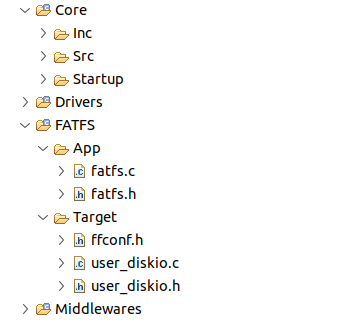
You should either delete or move user_diskio.c and user_diskio.h files to a save folder. They will be replaced with the following files for this project which is the device driver replacement for the MicroSD TFCard Adapter Module
user_diskio.h
/* USER CODE BEGIN Header */
/**
******************************************************************************
* @file user_diskio.h
* @brief This file contains the common defines and functions prototypes for
* the user_diskio driver.
******************************************************************************
* @attention
*
* Copyright (c) 2024 STMicroelectronics.
* All rights reserved.
*
* This software is licensed under terms that can be found in the LICENSE file
* in the root directory of this software component.
* If no LICENSE file comes with this software, it is provided AS-IS.
*
******************************************************************************
*/
/* USER CODE END Header */
/* Define to prevent recursive inclusion -------------------------------------*/
#ifndef __USER_DISKIO_H
#define __USER_DISKIO_H
#ifdef __cplusplus
extern "C" {
#endif
/* USER CODE BEGIN 0 */
/* Includes ------------------------------------------------------------------*/
/* Exported types ------------------------------------------------------------*/
/* Exported constants --------------------------------------------------------*/
/* Exported functions ------------------------------------------------------- */
extern Diskio_drvTypeDef USER_Driver;
/* USER CODE END 0 */
#ifdef __cplusplus
}
#endif
#endif /* __USER_DISKIO_H */
user_diskio.c
They will be replacing the following file for this project which is the device driver replacement for the MicroSD TFCard Adapter Module
/* USER CODE BEGIN Header */
/**
******************************************************************************
* @file user_diskio.c
* @brief This file includes a diskio driver skeleton to be completed by the user.
******************************************************************************
* @attention
*
* Copyright (c) 2024 STMicroelectronics.
* All rights reserved.
*
* This software is licensed under terms that can be found in the LICENSE file
* in the root directory of this software component.
* If no LICENSE file comes with this software, it is provided AS-IS.
*
******************************************************************************
*/
/* USER CODE END Header */
#ifdef USE_OBSOLETE_USER_CODE_SECTION_0
/*
* Warning: the user section 0 is no more in use (starting from CubeMx version 4.16.0)
* To be suppressed in the future.
* Kept to ensure backward compatibility with previous CubeMx versions when
* migrating projects.
* User code previously added there should be copied in the new user sections before
* the section contents can be deleted.
*/
/* USER CODE BEGIN 0 */
/* USER CODE END 0 */
#endif
/* USER CODE BEGIN DECL */
/* Includes ------------------------------------------------------------------*/
#include <string.h>
#include "ff_gen_drv.h"
/* Private typedef -----------------------------------------------------------*/
/* Private define ------------------------------------------------------------*/
#include "fatfs_sd.h"
/* Private variables ---------------------------------------------------------*/
/* Disk status */
static volatile DSTATUS Stat = STA_NOINIT;
/* USER CODE END DECL */
/* Private function prototypes -----------------------------------------------*/
DSTATUS USER_initialize (BYTE pdrv);
DSTATUS USER_status (BYTE pdrv);
DRESULT USER_read (BYTE pdrv, BYTE *buff, DWORD sector, UINT count);
#if _USE_WRITE == 1
DRESULT USER_write (BYTE pdrv, const BYTE *buff, DWORD sector, UINT count);
#endif /* _USE_WRITE == 1 */
#if _USE_IOCTL == 1
DRESULT USER_ioctl (BYTE pdrv, BYTE cmd, void *buff);
#endif /* _USE_IOCTL == 1 */
Diskio_drvTypeDef USER_Driver =
{
USER_initialize,
USER_status,
USER_read,
#if _USE_WRITE
USER_write,
#endif /* _USE_WRITE == 1 */
#if _USE_IOCTL == 1
USER_ioctl,
#endif /* _USE_IOCTL == 1 */
};
/* Private functions ---------------------------------------------------------*/
/**
* @brief Initializes a Drive
* @param pdrv: Physical drive number (0..)
* @retval DSTATUS: Operation status
*/
DSTATUS USER_initialize (
BYTE pdrv /* Physical drive nmuber to identify the drive */
)
{
/* USER CODE BEGIN INIT */
return SD_disk_initialize(pdrv);
/* USER CODE END INIT */
}
/**
* @brief Gets Disk Status
* @param pdrv: Physical drive number (0..)
* @retval DSTATUS: Operation status
*/
DSTATUS USER_status (
BYTE pdrv /* Physical drive number to identify the drive */
)
{
/* USER CODE BEGIN STATUS */
return SD_disk_status(pdrv);
/* USER CODE END STATUS */
}
/**
* @brief Reads Sector(s)
* @param pdrv: Physical drive number (0..)
* @param *buff: Data buffer to store read data
* @param sector: Sector address (LBA)
* @param count: Number of sectors to read (1..128)
* @retval DRESULT: Operation result
*/
DRESULT USER_read (
BYTE pdrv, /* Physical drive nmuber to identify the drive */
BYTE *buff, /* Data buffer to store read data */
DWORD sector, /* Sector address in LBA */
UINT count /* Number of sectors to read */
)
{
/* USER CODE BEGIN READ */
return SD_disk_read(pdrv, buff, sector, count);
/* USER CODE END READ */
}
/**
* @brief Writes Sector(s)
* @param pdrv: Physical drive number (0..)
* @param *buff: Data to be written
* @param sector: Sector address (LBA)
* @param count: Number of sectors to write (1..128)
* @retval DRESULT: Operation result
*/
#if _USE_WRITE == 1
DRESULT USER_write (
BYTE pdrv, /* Physical drive nmuber to identify the drive */
const BYTE *buff, /* Data to be written */
DWORD sector, /* Sector address in LBA */
UINT count /* Number of sectors to write */
)
{
/* USER CODE BEGIN WRITE */
/* USER CODE HERE */
return SD_disk_write(pdrv, buff, sector, count);
/* USER CODE END WRITE */
}
#endif /* _USE_WRITE == 1 */
/**
* @brief I/O control operation
* @param pdrv: Physical drive number (0..)
* @param cmd: Control code
* @param *buff: Buffer to send/receive control data
* @retval DRESULT: Operation result
*/
#if _USE_IOCTL == 1
DRESULT USER_ioctl (
BYTE pdrv, /* Physical drive nmuber (0..) */
BYTE cmd, /* Control code */
void *buff /* Buffer to send/receive control data */
)
{
/* USER CODE BEGIN IOCTL */
return SD_disk_ioctl(pdrv, cmd, buff);
/* USER CODE END IOCTL */
}
#endif /* _USE_IOCTL == 1 */
Code Differences
You will notice that there are differences between the original files created when the FATFS folder was installed after saving the IOC changes. Below is a comparison between the original and the one from this project. In this example, the USER_initialize function is calling a function declared in the fastfs_sd.c source file. This shows that we are using the correct replacement file.
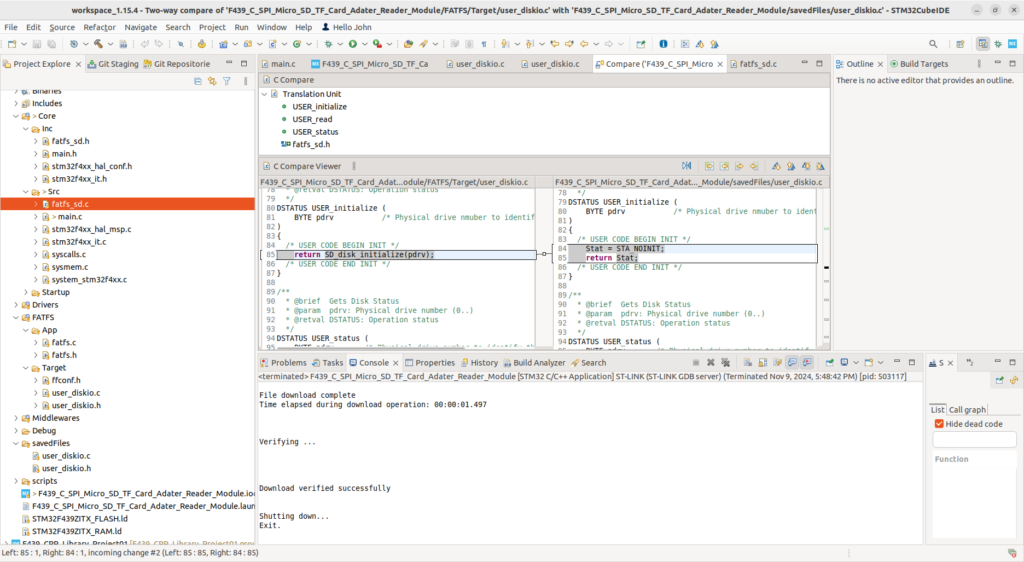
USART Output
